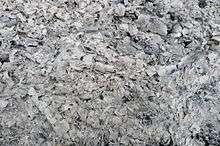Ash
Ash or ashes are the solid remnants of fires.[1] Specifically, it refers to all non-aqueous, non-gaseous residues that remain after something is burned. In analytical chemistry, in order to analyse the mineral and metal content of chemical samples, ash is the non-gaseous, non-liquid residue after a complete combustion.

Ashes as the end product of incomplete combustion will be mostly mineral, but usually still contain an amount of combustible organic or other oxidizable residues. The best-known type of ash is wood ash, as a product of wood combustion in campfires, fireplaces, etc. The darker the wood ashes, the higher the content of remaining charcoal will be due to incomplete combustion. The ashes are of different types .Some ashes which have natural compound makes soil fertile. But some which have chemical compound can make it toxic. but in some cases they are broken up by soil and microorganisms.
Like soap, ash is also a disinfecting agent (alkaline).[2] The World Health Organization recommends ash or sand as alternative when soap is not available.[3]
Natural occurrence
Natural occurrence the natural occurrence mostly depends upon fire ,and effects mainly on natural vegetation. The main agents are Lightning volcanic activities and other activities after the vegetation is dead the ashes maybe submerged in soil to make it fertile or may be get deepened under the soil for long period of time, And this can result to carbonisation and convert them in to coal. The ashes are of different types .Some ashes which have natural compound makes soil fertile. But some which have chemical compound can makes its toxic. But in some cases they are broken up by soil and microorganisms.
Specific types
- Wood ash
- Products of coal combustion
- Bottom ash
- Fly ash, product of coal combustion
- Breeze, ash recovered from burning urban rubbish
- Cigarette or cigar ash, the ash produced when a cigarette or a cigar is smoked
- Incinerator bottom ash, a form of ash produced in incinerators
- Vibhuti, ash used in Hindu rituals
- Ashes and dried bone fragments, or "cremains", left from cremation
- Volcanic ash, ash that consists of glass, rock, and other minerals that appears during an eruption, black soil which is the result of the volcanic eruption and comprises of ash and other volcanic material.
See also
- Cinereous, consisting of ashes, ash-colored or ash-like
- Potash, a term encompassing many useful potassium salts which were traditionally derived from plant ashes, but today are typically mined from underground deposits.
- coal, consisting of carbon as ash, and ash can be converted into coal.
- carbon, ashes consist this.
References
- "the definition of ash". www.dictionary.com. Retrieved 2018-06-18.
- Howard et al. 2002: Healthy Villages A guide for communities and community health workers. CHAPTER 8 Personal, domestic and community hygiene. WHO. Accessed Oct. 2014. http://www.who.int/water_sanitation_health/hygiene/settings/hvchap8.pdf
- WHO 2014: Water Sanitation Health. How can personal hygiene be maintained in difficult circumstances? Accessed Oct. 2014 http://www.who.int/water_sanitation_health/emergencies/qa/emergencies_qa17/en/